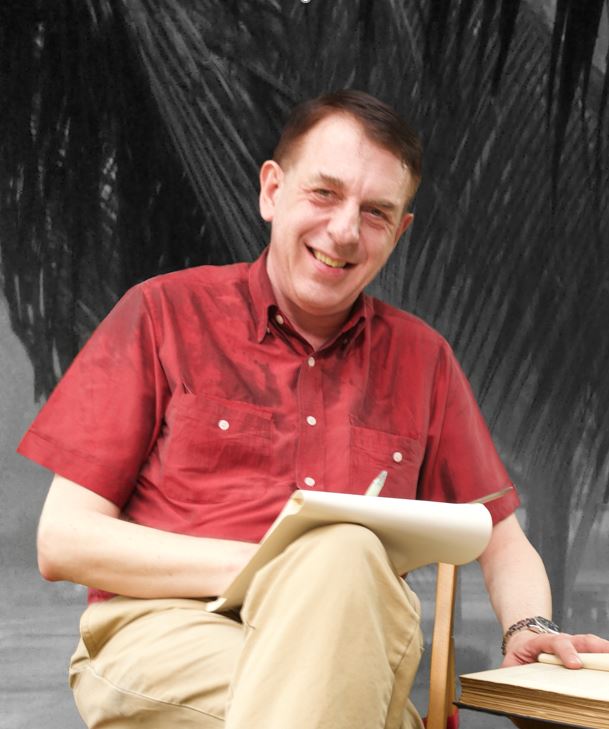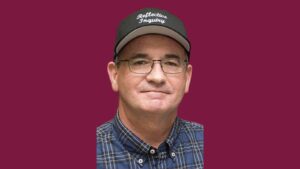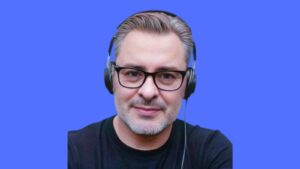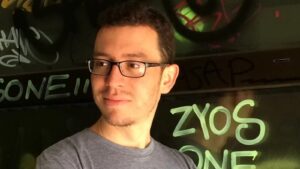by Sharyn Collins
Bruce, thank you for doing this interview. You are an EFL trainer and your book, reviewed by Steve Hirschorn, is described as uncategorizable but highly worth a read. I am intrigued. I know you didn’t just sit down one day and start writing a book, so before we talk about English from Afar, could I ask how you got into EFL?
Gosh, where to start? Well, I decided to follow a career in Engineering, having gained a degree from the University of Wales. One of my friends from those days remarked when we were discussing why I’d chosen the Swansea college of the University, that he felt that I never really felt at home in England and I think he was very perceptive. Travel was certainly on the horizon for me.
My first job took me to Tripoli in Libya in the autumn of 1982. You can imagine that was quite an experience for a 24-year-old graduate but I learned something there which has characterised my working life and that is, the importance of developing working relationships with people of different faiths and ethnicity. You cannot work well together if you do not get on as people.
I know you are well travelled, so how many countries have you worked in so far?
So many countries and mostly in the Middle East and Asia. It would actually take me quite a while to count them. One of the greatest things I learnt from all of this experience is that there is a great deal of similarity between teaching and the kind of consulting Engineering work that I’ve done. Very often you build a process, test it and then educate the local team to run it and also try to give them the tools to troubleshoot when things go wrong, as they do from time to time.
When did you make the transition from Engineer to teacher and what prompted the move?
The easy answer to the second part of your question is that I wanted to make a difference.
I think my life went through a major change when I was posted to Kuala Lumpur in 1996. I was living in Hong Kong and my boss said: “go down to KL and finish up a project for us, it should only take a couple of months”.
I found the environment agreeable, the client and I seemed to get on well and the client kept on asking me to stay on; so much so that two months became two years! The interesting thing was that in addition to the day job as it were, I seemed to become the “go to person” when matters of English came up. People would beat a track to my door saying “what does this mean”, “how do I use this” and “what should I say in this situation”?
It was during this time, I started to realise that it was the communication rather than the Engineering that I was enjoying more and more. There is also a critical issue here, it bothers me that generally, we seem to be getting less good at communication as time goes by. This makes the world a more dangerous place with our modern weapons and so on. Fundamentally if we’re talking we can’t be fighting, so my passion is to get the talking going! I also happen to believe that, historically, it was the British who pioneered the concepts of international trade and paved the way for a general acceptance of English as the “general language”, therefore I feel that we have a responsibility to foster good communication in the English language. On a personal level, you could say that its a way of “giving back” for the years of hospitality that I’ve enjoyed.
Apart from engineering, had the idea of becoming a teacher always been somewhere in the depths of your mind?
Not really. I hated languages at school! I will admit it I was a disruptive school student. Simply, I was bored, and there is no “law of education” which says that language tuition must be boring. Now I realise that the big issue for me has been what we call the “buy-in” in the commercial world. If you get the students to “buy in” to the subject at hand, they do remarkable things because we’ve captured their imagination. That’s why although I’m a qualified ESL teacher, I prefer to say that I “teach communication in English”. If nothing else, I find that most of my students have enough of the basics to reach a stage of self-sufficiency; what they are often looking for is a mixture of confidence and preparational advice.
While the idea of being a teacher wasn’t in my mind, I believe the idea of being writer was. But it was something that took time to mature, that’s why I made the switch after 32 years practising as an Engineer. I also think, for my perspective, I needed to have done the University of Life thing, been around the world, ended up in a few narrow squeaks, learning as I put it to my father once to “dance between the rain drops”. Having done that I did a TESOL teaching course here in Kuala Lumpur.
As a case in point I think it’s the research that I find so interesting, I’ve been fascinated with the story of the assassination of former American President John Kennedy in 1963 for a good many years. I was also taken by what I view as a shaggy dog story – the involvement of his alleged killer, Lee Harvey Oswald, which struck me as being farcical and I started to do some research which led to a collection of political essays. It was never my intention to publish these but to see if I could actually complete a book. Now there are some topics in there which might well bear being turned into books. So for books to come, there is, in fact, no shortage of subject material
Going through the writing process, I was surprised by just how much I got out of producing a piece of work. Along the way, new thoughts and ideas would present themselves, which in turn needed further research and so on. I was fascinated by how much detail I uncovered, from fragments scattered about the internet and other sources.
But there is another side to all this, my father was tight-lipped about his wartime experience and his latter work which I found intriguing. On my 36 birthday I was due to fly out of Heathrow and as I was leaving the house, he gave me a parcel and said, “son you wanted to know what I did – read that on the plane”. It was Brian Cathcart’s, “A test of greatness” the story of the British Atomic project codenamed Tube Alloys. Through the book and with fragments I have been able to piece together I now suspect that for example, my father may well have known H. A. R., Kim Philby! The well-known agent who spied for the Russians, or did he?
So let’s return to your book, English from Afar, how did it come about?
Well, let me tell you about the book which came before this one first. Quite by chance a colleague in Kuala Lumpur came to me about 7 years ago. We were both on downtime between assignments and he suggested that we write the first textbook on the particular aspect of the communications business that we have both worked on for a considerable number of years. It sounds horribly boring and lifeless “Managed Services”, but before you wonder what on earth that means, it’s basically outsourcing. To be honest I was really quite eager and agreed. I felt that this was a transition step and it was great not having to do the whole thing myself. I think it was an excellent training ground in preparation for going out on my own with English from Afar. Although I think Ray, my colleague, would be the first to agree with me we really were so very green and didn’t know what we were taking on because it was a huge piece of work. This once more took me into new areas of research, and it was my first published work.
I remember very well the day that I went down to the printers here to collect the first 25 proof copies. Stopping off on the way back to drop off a copy with my father who was living here then, I put a copy in front of my TV and just looked at it for perhaps a full half hour; not so much from a sense of pride but the simple fact – we’d done it!
I’m not going to pretend that it was a great success commercially – it wasn’t, the odds against that are phenomenal and as I said we were green but I’d learned enough to know that I enjoyed the creative process. So, having decided to make the jump, I was starting to put some interpersonal communication skills courses together when it hit me that I should write the textbook to go with them. After that well, as they say the rest is history, in fact I would go so far as to say that English from Afar took on a life of its own!
I’d been this walking dictionary cum encyclopaedia for 20 years. I found I was asked to convey meaning so often that I started to form this mental list of topics in my head of English as it is spoken. Finally I decided to take my lead from the topics already formed in my head and it became a manual on English like “what she is spoke”. As native English speakers I don’t think we realise just how confusing or perverse English can be; we often say the exact opposite of what we mean. However, by focussing on what I’d been asked, I hoped to make it up to date and relevant to the modern day student. My essential point being that there are any number of books on grammar or what have you, what’s more I’m sure most of them are far more structured and better from a formal perspective. My aim is not to replace those texts but to add by addressing the issues and questions that come after. I also set out to be fastpaced, witty and not something which was a chore to work one’s way through. I wanted to give the reader a sense of achievement quickly which is why the chapters are short and to the point. My colleague Ray said that one thing he found very pleasant about my writing was that as he read it it was more like me being in the same room and having a discussion with me. I think that’s one aspect that I started out with as a goal from the very beginning.
I get a real kick out of trying to use English constructively, elegantly and imaginatively. What’s more, up till now, I have nothing in my life so rewarding or absorbing as this new metier but that comes in different ways: there’s a passion in trying to de-mystify the English language and there’s another kind of passion that comes out for example when one of my students calls me up, well, these days sends me a social media note, saying that they’ve succeeded and won the scholarship place that they wanted.
Will there ever be a volume 2?
Volume 2 is about 50% written but, and it’s a very big but, it’s not a formula, that is to say not more of the same. I’m working on volume 2 being very different. Volume 1 tries to focus on acquiring English skills, volume 2 takes an off beat look at what you might describe as “mayhem with English”. One of the reasons for that is that I have actually seen the situation, more than once, where the English as a Second Language speaker was better versed in the rules and mechanics of English than the native English speaker they were talking to and so they did not communicate well. This lead me to my thought that the proficient English speaker knows the rules of English and applies them at all times but, the fluent English speaker knows when and how to break the rules the way the native speakers do. They understand that a sign saying “liquid hand soap” means “liquid soap for hands”, that “green mosquito netting” refers to the colour of the netting not the mosquitoes and so on.
Bruce, as you seem to enjoy conspiracy theories, is there perhaps a novel ready to be written?
Well, yes there is a Cold War thriller I would like to write with Orwellian terms of reference very much rooted in both Animal Farm and 1984. I’ve already got the outline for that and I would like to have a shot at (pardon the pun) turning it into full theatrical two-hour movie as well, rooted in known facts such as the Manhattan project, the US entry into the second world war, the death or possible escape of Hitler, the murder of JFK, Kim Philby’s defection, almost up to the present day. Let’s see.
It seems with you particularly, there is a great need for the content of your books to be current. How do you keep up with current trends?
Very much so, I don’t wish to see any student bogged down with some of the dreary and out of date stuff I had. I believe that the syllabus of today is far more relevant but we still need to go further, I think that the US English will split from UK English before too long, not that there is anything at all wrong with the US English, but it is a different variant just as Malaysian English is, however in maintaining regional diversity with for example Malaysian or Canadian English we should also strive to ensure that the UK English variant survives as well. As for keeping up to date, I’m a 24*7 internet surfer, so I’m always checking out new trends and the latest internet resources when planning a tutorial, although there is no specific magazine that I read as a matter of course. Part of that is that I function to a certain degree outside the regular syllabus although making sure that as and where needed I’m fully aligned.
Having said that I also regularly scan through magazine pages such as EFL Magazine, I read your interview with Steve Hirschhorn on communicative language testing with great interest as I’ve been looking at the question of testing the students rather than the teaching for some time. As a case in point, a lot of what English from Afar is about is getting meaning understood rather than the finer points of grammatical accuracy. In other words, being able to undertake a communicative transaction successfully or as I put it the “transference of meaning”. Given that nearly all my teaching is delivered remotely via the internet another very interesting article was Giuseppe Carone’s piece on FLT at the dawn of the 21st Century.
The new teaching paradigm seems to be more about coaching than teaching, is this something you are thinking about?
I think that coaching is a part of the overall subject of teaching, I do quite a bit of coaching for business English, effective communication at work and things like emails and reports. But it is a newer concept, as such it functions in a slightly different space, coaching can absorb some elements of teaching and do it well by being in a one to few environment. A lot of that is very student oriented and in making it as meaningful as possible for the individual it needs to take their proficiency into account. Very much what Chia Suan Chong was talking about in her blog piece in English Teaching Professional “Work Your Students into your lessons”. It’s not so much “doing my own thing” as a methodology but taking my prompt from the student and their needs within the context.
What would you like to say, as your last words in this interview?
I have a dream (sorry I couldn’t resist the Rev. Martin Luther King reference) that one day the need to be clear in what we say will overtake the wish to be hasty. So often I have asked people who are bemoaning having to go back and clarify something at length, “wouldn’t it have been better to check what you said and for that matter think about how it will be received than be faced with an irate and incensed person and having to carry out a rear guard, difficult and time consuming process of calming someone down and restoring normality”! What’s more is just how often they agree.
Also I would like to finish by saying that my greatest wish is to see mankind channel his ingenuity and creativity into the common good, with the elimination of conflict and the ability of all to achieve their full potential.
Thank you Bruce, you call yourself a bit of Maverick. I can now say that I agree with you. EFL needs Mavericks.
It’s been a real pleasure Sharyn thank you!
Bio
Bruce Petersen has spent the last 23 years in Kuala Lumpur, first as a telecoms engineer and consultant and later as an EFL teacher. He now divides his time between writing books, teaching EFL and producing television documentaries.
[email protected]





